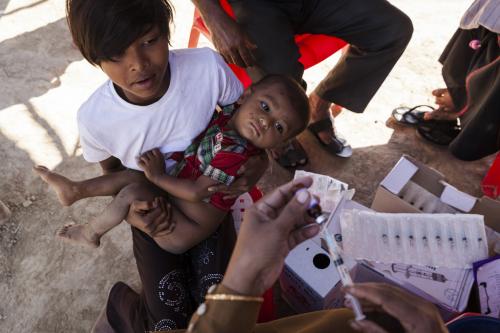Bangladesh: UN agencies working to vaccinate half a million children against diphtheria
As part of an intensified response to the current diphtheria outbreak, United Nations agencies are working to vaccinate more than 475,000 children in Rohingya refugee camps, temporary settlements and surrounding areas in Bangladesh's Cox's Bazar.

UNICEF is on the ground in Bangladesh, immunizing Rohingya refugee children to fight the spread of disease, and delivering life-saving nutrition to the tens of thousands of children who are malnourished.
“All efforts are being made to stop further spread of diphtheria. The vaccination of children in the Rohingya camps and nearby areas demonstrates the health sector's commitment to protecting people, particularly children, against deadly diseases,” said Bardan Jung Rana, ai Representative to Bangladesh of the World Health Organization (WHO).
UN estimates show that some 655,000 people have fled Myanmar to Bangladesh since August 2017.
Diphtheria is an infectious disease caused by a bacterium which primarily infects the throat and upper airways, and produces a toxin affecting other organs. The diphtheria toxin causes a membrane of dead tissue to build up over the throat and tonsils, making breathing and swallowing difficult. The disease is spread through direct physical contact or from breathing in the aerosolized secretions from coughs or sneezes of infected individuals.
Between 8 November 2017 and 11 January 2018, as many as 31 deaths and 3,954 suspected cases of diphtheria have been reported from Cox's Bazar. Nearly 10,594 contacts of these suspected cases have been put on diphtheria preventive medication.
WHO, the UN Children's Fund (UNICEF) and other health partners are working with the Ministry of Health and Family Welfare to establish fixed locations for immunization in the Rohingya camps to continue to provide life-saving vaccines to children, in line with Bangladesh's childhood immunization programme.
Nearly 150,000 children aged six weeks to seven years received pentavalent vaccine (that protects against diphtheria, tetanus, pertussis, haemophilus influenza type b and hepatitis B), and nearly 166,000 children aged 7 to 17 years were given tetanus and diphtheria (Td) vaccine, during a three-week vaccination campaign that ended on 31 December.
Two more rounds of vaccination with a diphtheria-containing vaccine, at intervals of one month, are planned to fully protect the children in camps and surrounding areas.
“Children are particularly vulnerable to diphtheria. Volunteers are making door-to-door visits in the Rohingya settlements to ensure all children receive vaccination,” said the UNICEF Country Representative Edouard Beigbeder.
“The massive influx within a very short time has heavily affected basic services in the settlement areas. They have no choice but to live in a very congested environment, which is impacting their health and quality of life,” he added.
To limit the spread of diphtheria to communities living near the Rohingya camps and settlements, nearly 160,000 children in 499 schools of Teknaf and Ukhiya sub-districts are also being vaccinated.
This initiative began on 1 January. Vaccination was initiated on a day when children attend school in large numbers to avail themselves of free books provided by the government at the start of the academic year.
WHO has released $1.5 million from its Contingency Fund for Emergencies to scale up the response to diphtheria among the Rohingya population in Cox's Bazar, Bangladesh, over the next six months.
The funds are being used to support immunization; provide essential medicines and supplies; improve capacities for laboratory testing, case management and contract tracing; and engage with communities.
Source:United Nations
- 380 reads
Human Rights
Fostering a More Humane World: The 28th Eurasian Economic Summi

Conscience, Hope, and Action: Keys to Global Peace and Sustainability

Ringing FOWPAL’s Peace Bell for the World:Nobel Peace Prize Laureates’ Visions and Actions

Protecting the World’s Cultural Diversity for a Sustainable Future

Puppet Show I International Friendship Day 2020

